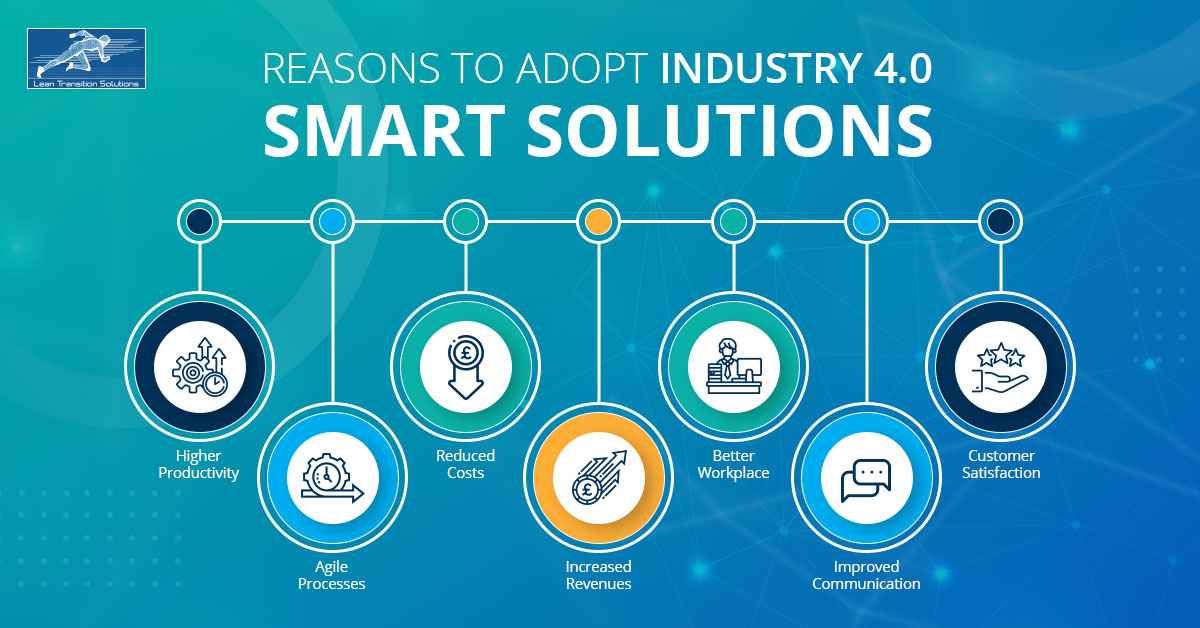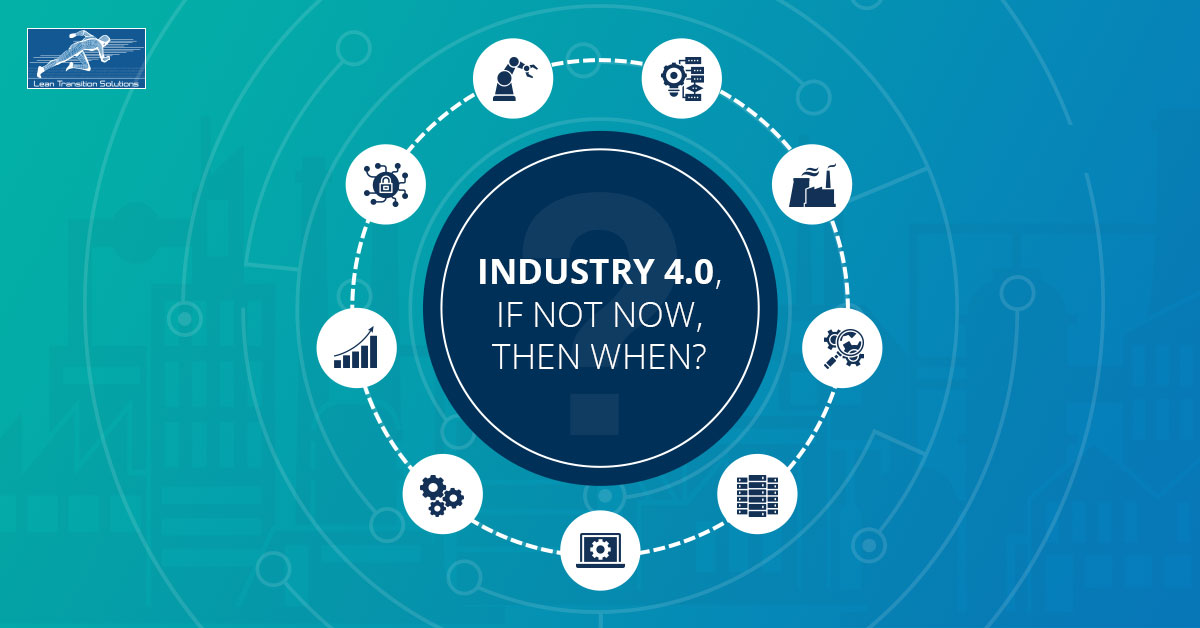7 Reason for Businesses to Adopt Industry 4.0
- By Brett Griffiths
- Lean Technology
- December 15 , 2021
- Share

“At least 40% of all businesses will die in the next 10 years… if they don’t figure out how to change their entire company to accommodate new technologies.” — John Chambers, Cisco. Now is the time for Industry 4.0! The fourth industrial revolution is not an idea that is evolving; it is a reality that has already occurred. In simple terms, Industry 4.0 aims at the digital transformation of business by integrating various systems and technologies that makes the whole process more adaptable, flexible and efficient. Industries around the globe have started adopting Industry 4.0 smart solutions and affirm the positive impact these solutions had on their businesses. These solutions result in increased productivity and reduced waste without compromising the quality of products. Now is the right time to embrace the change and get ready for the paradigm shift; if not now, businesses might lose their relevance in their current marketplace.
What is Industry 4.0?
Industry 4.0 is the current trend of data exchange and automation in manufacturing technologies. Industry 4.0 bridges the gap between the physical and digital world through cyber-physical systems enabled by Industrial IoT. Industry 4.0 is all about merging physical and digital worlds to gain meaningful data insights, resulting in increased productivity and efficiency. The ultimate aim of Industry 4.0 is to transform factories into smarter factories. Organisations have already started adopting smart solutions realising it’s full potential. Smart factories are the reality that has already arrived.
Reasons to Adopt Industry 4.0 Smart Solutions

Technology is progressing exponentially, impacting our daily lives. In a time span of five to ten years, Industries will have no other option left other than adopting Industry 4.0 technologies as they won’t be able to sustain in this competitive marketplace. While many organisations deny how Industry 4.0 could have an impact on their business, others have implemented changes and are preparing for a future where smart machines improve their business processes. The benefits that Industry 4.0 offers are crucial and apply to every company in every industry.
1. Higher Productivity
Industry 4.0 help organisations do more with less. Allocate resources efficiently, increase production, reduce waste, improve customer satisfaction, save time and cost. Ensure greater efficiency with faster decision making.
2. Agile Processes
Increase business processes in a volatile environment by enhancing the resilience of the organisation—flexible and scalable Industry 4.0 integrated system to effectively manage change and uncertainties in processes.
3. Reduced Costs
Move to automated processes, increase efficiency—lower operating costs and reduce waste in manufacturing through better utilisation of resources. Higher automation saves labour costs and improves output. Automatically optimise resources for minimum wastage.
4. Increased Revenues
Industry 4.0 ensures higher ROI. Produce high-quality products, increase customer satisfaction—staunch a stable position in the marketplace. Implementation of automation, data management, systems integration, and artificial intelligence will increase the profitability of your business.
5. Better workplace
Incorporating new technologies into business ensures a better and smart workplace. The combination of automated solutions and human labour directs to more fulfilling roles that result in the development of an organisation.
6. Improved Communication
Gather real-time data analysis and meaningful insights. Detailed data is collected, stored, analysed and shared across departments to ensure transparent communication. From production planning to execution, every step of the process is communicated across the departments, which promotes a connected work environment.
7. Customer Satisfaction
Customer is the king! Meet customer expectations and demands. Provide quality products to customers at low cost and great availability. Address issues and ensure excellent customer service. Make them fall in love with your products.
Accelerate Digital Transformation!

Many of the world’s top manufacturers have already moved into the implementation phase of technology-enabled manufacturing. Realising the need for a change within your organisation is the first step to accommodate new smart technologies. Digital transformation is an inevitable reality for businesses today. Tim O’Reilly, Founder & CEO of O’Reilly Media, rightly said, Every industry and every organization will have to transform itself in the next few years. What is coming at us is bigger than the original internet, and you need to understand it, get on board with it, and figure out how to transform your business.” “ Rome wasn’t built in a day! Incorporating and integrating innovative digital technology into business can take time and effort, but once done the organisations will be overwhelmed by the shift the business would take in all aspects. Read more on ‘Baby Steps to Industry 4.0 Transition.’
Future of Industry 4.0 & Dark Factories
In no time manufacturing industry will see the rise of Dark Factories. Dark factories are the fully automated factories of the future that can work without or with less human labour Dark factories (where the lights are off) can work 24*7 with automated robots and increase productivity with zero error in manufacturing processes. Industries across the globe look forward to a fully automated environment; while some are still pondering upon the so-called idea of Industry 4.0, others have already begun their journey and have seen drastic changes in their businesses. It has become a necessity for industries to be more advanced and updated.
If Not Now Then When?

Where are you with your Industry 4.0 journey? By not adapting to Industry 4.0 environment, you risk getting left behind in the competitive world, that too permanently. Industry 4.0 is not a single destination; it is a journey where you constantly find ways to improve processes by incorporating innovative technologies. Manufacturers that have already introduced automation into their facilities are ahead of the curve. Transformation is hard but not impossible. New advancements are being made each day, and embracing change has become inevitable.
Start Free Trial
LEAN TRANSITION SOLUTIONS
The Old Vicarage, Pershore Road, Upton Snodsbury, Worcester, Worcestershire, WR7 4NR, United Kingdom.
Lean Transition Solution
-
Lean Industry 4.0 Solutions
- TITAN:Computerised Maintenance Management System
- Data Point:Computerised Balanced Scorecard
- Janus: Automated Shop-floor Data Capture System
- T-Card: Integrated Production Planning and Plant Level Execution System
- JDI: Maintenance Automation App
- Maximus: Integrated ERP System
- e-Contractor: Integrated In-house Contractor Management System
- Q-Point: Integrated Quality Management System
- Safety-Point: Integrated Health and Safety Management System
- Lean Assessment: Lean Audit and Assessment System
- Saisho: Lean 5S Audit and Assessment App
- Emergency Response App: To Manage Emergency Situations
-
Leadership 4.0 Solutions
- Your Career Academy(YCA): Learning and Development System
- YCA e-Learning : Management System
- MentorYou(MU): Mentoring App
- Leadership 4.0 : Leadership Transformation Program
- Lean Manufacturing Workshop
- Lean Manufacturing Consulting
- ILM Accredited Green Belt Training and Certification Program
- ILM Accredited Black Belt Training and Certification Program
- Software Development Service
- Resources
- Company
- Contact











